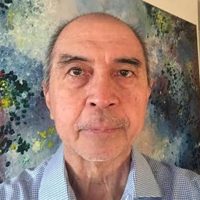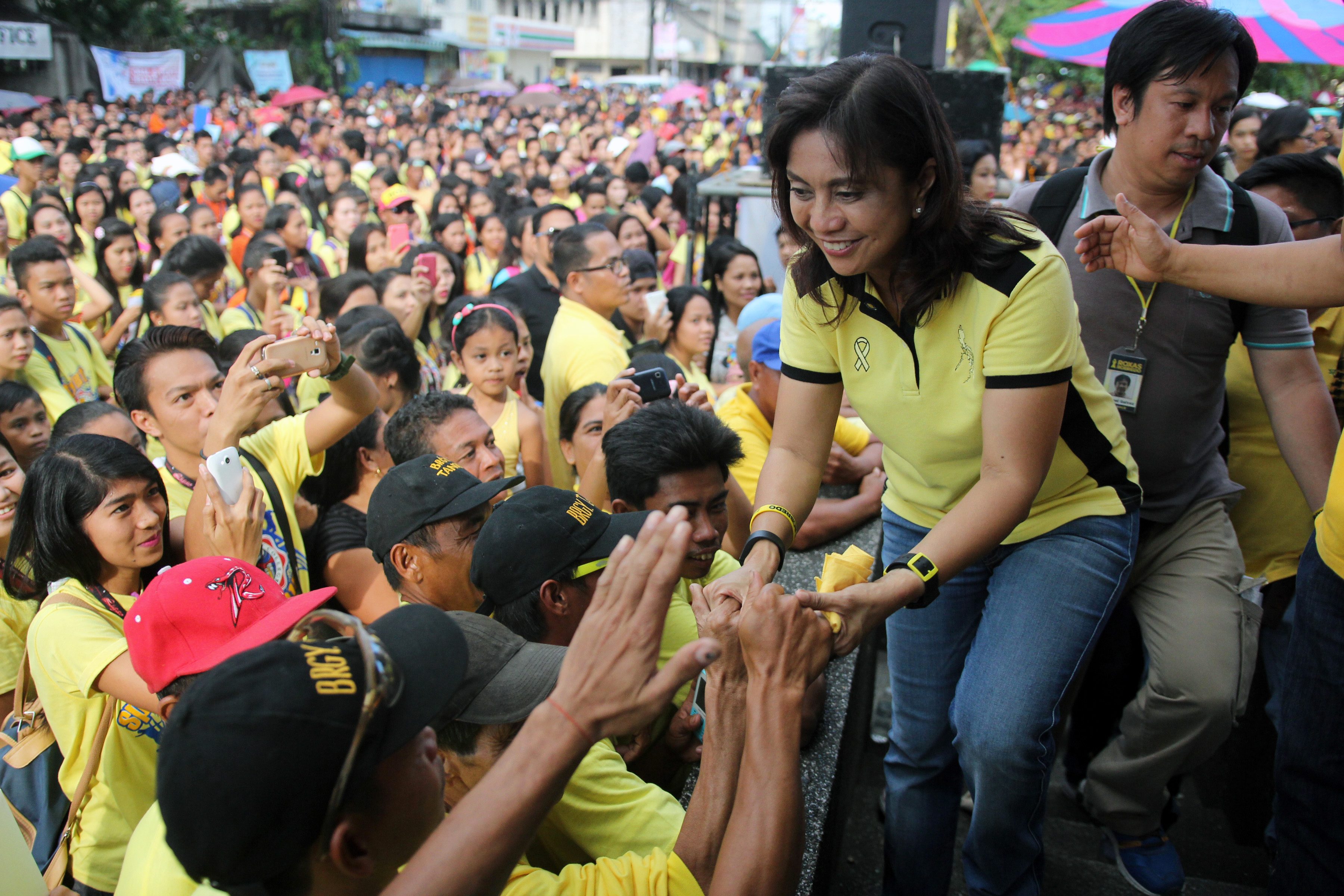SUMMARY
This is AI generated summarization, which may have errors. For context, always refer to the full article.

Recent reports have floated the idea that the ruling party is considering “dropping Leni Robredo” as its vice-presidential candidate due presumably to her poll numbers and the perennial concern for “winnability.”
This seems to fly in the face of facts, precisely because among all candidates for vice president she has registered the most consistent surge in numbers, moving up from a national awareness of a mere one percent just a few months ago to nearly 20 percent. This is due in large measure to her high conversion rate: that is to say, among those who have become aware of her candidacy, 4 out of 5 end up supporting her bid as the most worthy of those seeking to serve as the country’s vice president.
Moreover, in the context of the recent commemoration of #EDSA30, Leni Robredo perhaps best embodies people-powered leadership and one whose life’s journey has been influenced by the events of February 1986.
The 1986 people’s power experience was the game-changer in Leni Robredo’s life.
“After graduating, I would go straight to law school and be a lawyer like my father,” Leni thought. However, life changed for the “iskolar ng bayan” who finished college at the University of the Philippines School of Economics soon after the events that led to the downfall of the Marcos dictatorship. Having participated in mass actions on and off the campus, Leni felt inspired to give back to her people “in the spirit of EDSA”. It was then that she decided to involve herself in public service.
Taking the road less travelled
Bringing with her a note from an uncle of the director, she applied for a post at the Bicol River Basin Development Program (BRBDP). Then program director, Jesse Robredo, said “it was no longer done that way.” He asked her instead to write an essay. Leni chose the theme of Cory Aquino’s role in the 1986 people’s power experience, and that became her ticket to the post. The young graduate put heart and soul into the task she undertook in developing programs to improve the lives of people in three Bicol provinces.
Within a year Jesse proposed to her in what she described as a “whirlwind romance” conducted in a “traditional way.” Even before he courted her, he asked permission from Leni’s father, the former Naga City Regional Trial Court Judge Antonio Gerona, who objected, saying that Leni still had her law studies ahead of her. Jesse assured her father that he was going to make sure that Leni was going to become a lawyer. They were then married in 1987, and she took up law studies as a working mother, graduating from the University of Nueva Caceres and passing the bar in 1997. It was then early in her married life that Leni undertook the less-travelled journey: from working mother to alternative advocate and servant leader.
Lessons on good governance on the ground
Leni’s late husband, Jesse Robredo, served as mayor of Naga City for 3 terms from 1988 on; and again, from 2001 to 2010 transforming the city and the lives of his constituents in the process. He later was designated secretary of interior and local government till his death in 2012 propagating principles of transparent and accountable government – earning for his city multiple national and international awards and becoming the 2000 Ramon Magsaysay Awardee for government service.
Leni shared Jesse’s simple life-style and brand of serving local people at all times that inspired a following. Bringing government closer to the people was a key lesson that Leni learned in the footsteps of Jesse’s “tsinelas brand of leadership.” Leni drew her strength from people and thus practiced the art of leading by first listening. Her style has always been participative, inclusive, and always accessible to people from all walks of life.
During her husband’s 21 years as a public official, Leni chose to keep a low profile. The life she chose was that that of a loving wife, a working mother and a public advocate to help disadvantaged people. She was a human rights lawyer who with her light footprint made a huge difference in the towns and villages she served. She sought to improve the lives of people not by hand-outs but by helping them become more self-reliant and better able to build more resilient communities.
In 1989, she founded the Lakas ng Kababaihan ng Naga Federation which provided for training and livelihood opportunities for women. In 2007, she became coordinator of the Bicol branch of Saligan – a center for alternative para-legal education and action addressing concerns of farmers, fisherfolk, workers and marginalized people. In November of the same year, she supported the Sumilao farmers from Bukidnon in their march through Bicol on their way to present their grievances in Manila.
Saligan was awarded the “Kabalikat ng Bayan Award” for exemplary efforts to achieve sustained growth and development through para-legal education and networking. In 2009, the VACC (Volunteers against Crime and Corruption) designated Leni “Most Oustanding Private Prosecutor.”

Confronting tragedy, overcoming adversity
Leni had been married to Jesse for 25 years with 3 wonderful daughters: Aika, the eldest, Tricia and Jillian before tragedy struck.
Jesse normally spent weekends with family in Naga. Coming from Cebu where he had consultations with local government, he wanted to watch his youngest daughter’s swimming competition and hoped to arrive on time. He decided to take a private plane, a 4-seater Piper Seneca, which soon after take-off developed engine trouble and plunged into the sea off the coast of Masbate.
Literally minutes before the tragic crash, Jesse was calmly on the phone talking with Leni about the children. Leni was then on her way to the airport to fetch him. When word reached Leni that a search and rescue mission was underway, she immediately got in touch with her eldest Aika who was then watching the UAAP game between Ateneo and FEU. After hearing the heartbreaking news from her mother, she directly went to fetch her sister to pray instead. At different times in their lives, Leni always turned to prayer.
“Life is really about facing the unexpected,” Leni observed. “We can never really plan too far ahead.” In a sense, this sums up Leni’s journey undertaken with the uncommon courage of a widow and one who had taken on her life’s mission of being a voice for the voiceless.
When deciding on Jesse’s final resting place, her answer was unequivocal: “Naga has always been Jesse’s happy place. This is home, and where he wants to be.”
Taking on an improbable challenge
Grieving for a loved one who was her confidante and partner was difficult, but she was mother and father to three and had to move on.
Shortlisted as a Regional Trial Court Judge in Bicol, she decided instead to re-apply in Quezon City where her children were still studying. Her children were her priority, and anything else had to take a back-seat. However, circumstances beyond her control once again intervened. Jesse had left a legacy, and Leni had “miles to go” so to speak before she could turn her back on the call to serve.
When the leaders in her home province couldn’t decide on a nominee for Congress in the 2010 elections, they turned to Leni to hold together the “tsinelas” coalition, so to speak. Leni was then asked to run and face a formidable foe in a Villafuerte whose political dynasty had long ruled the province for generations.
Against all odds, Leni won by a landslide garnering more than 71,000 votes winning nearly two thirds of the vote going from house to house, barrio to barrio, town by town in the third district of Bicol’s Camarines Sur.
Focused efforts
Taking her seat in Congress, she continued with her advocacies. She was a veteran in the causes which people cared most about and she began to craft legislation that met the needs of the most vulnerable who in her decades of service on the ground had touched her life.
Leni focused her efforts on 3 strands of work:
- People’s empowerment: focusing on the needs of the disadvantaged, particularly, women, youth and children;
- Accountable governance: focusing on people’s participation in decision-making as well as transparency in government;
- Poverty Alleviation: focusing on the needs of the more vulnerable sectors in society so that those who have less in life are given more protection in law.
In her years accompanying the more vulnerable in society, this people power veteran had gained valuable experience in understanding the needs of people and crafting processes to involve people in the decisions that affect their lives.
At this stage in her life, Leni better understood because she had stood with those who literally were “barefoot.” She had walked their walk and had become one with them as she grew in wisdom learning from the so-called “little people” from the provinces, the famers and workers, informal settlers, and women from the barrios of Bicol.
Another call to serve
Leni had learned to navigate a “journey without maps,” and when the call to serve came to run for vice president with the Liberal Party’s Mar Roxas she had no ready answer. This time, this once shy student who had studied at the local Colegio de Santa Isabel in Naga had to seek her daughters’ permission and once again fall on her knees in prayer.
When Leni finally made her decision to run in tandem with Mar, people knew that Leni provided an alternative option: a grassroots worker who had integrity, honesty, humility. She was dedicated, determined and steadfast. She was the “real deal.”
If only people in different parts of the country knew her better, heard her story, understood her narrative and the causes she cares about, they would be inspired to join in a common cause for she is truly a servant leader with a “tsinelas brand of leadership.”
Leni will bring honor to our country, hope to our people and trust in our leaders. Leni as a leader can inspire our youth and our women to become part of building a future different from the past.
Leni’s time has come. Leni as servant leader can truly make a difference. – Rappler.com
(The author was one of Leni Robredo’s professors in political science subjects she took as electives at the University of the Philippines. He had in his classes 2 of the other candidates for vice president, Alan Peter Cayetano and Chiz Escudero at UP. Prof Garcia, who was also a member of the 1986 Constitutional Commission, was involved in the people’s power experience against the Marcos dictatorship and was one of the co-founders of the Kilos Laban sa Kudeta in the late 1980s, which campaigned against military adventurists who sought to bring down the constitutional government in that period.)
Add a comment
How does this make you feel?
There are no comments yet. Add your comment to start the conversation.